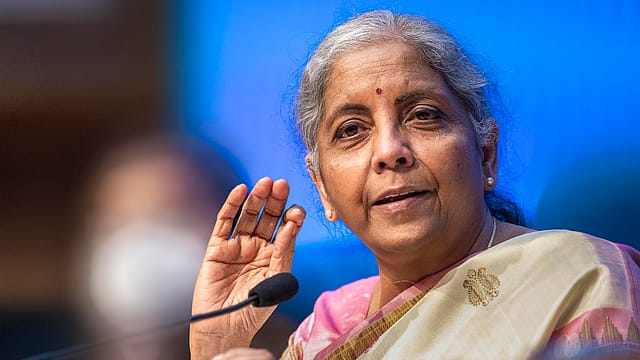Digitisation led to maximum financial inclusion in MSMEs: FM
ADVERTISEMENT

Finance Minister Nirmala Sitharaman, during an event organised by RSS-affiliate Laghu Udyog Bharati that is devoted to small businesses, today said 'due payments in due time' is what is the lifeline for MSMEs, and that it's everyone's duty to ensure their dues are cleared in time as they are the backbone of the country.
"If you have to consider the way in which Indian economy is building up so that it can help small businesses and make sure facilitation reaches, is the way in which we brought digitisation," she says.
The FM adds that digital entry or deepening digital excess is maximum in India as compared to other countries. "As a result of this, if MSMEs (micro, small and medium enterprises) have achieved maximum financial inclusion," she adds.
The FM urged the private sector and the industry to commit to making the payments in 45 days, along with the books of accounts filed with the Registrar of Companies, which make mention of outstanding dues. "The private sector should also be ahead in this issue," she says.
She also promised that the Centre will take more initiatives to address their issue and urged government departments and PSUs to make their due payments to MSMEs within the 90-day timeline.
As per the MSME ministry data, India had 7.9 MSMEs as of March 2022. Their share in India's GDP is expected to grow 100% by 2025. MSMEs were most hit during the Covid pandemic. Over a quarter of India's MSMEs lost a market share of over 3% due to the Covid-19 pandemic, shows a Crisil report.
Half of them suffered a contraction in their earnings before interest, tax, depreciation and amortisation (EBITDA) margin as a result of a sharp rise in commodity prices last fiscal, compared with the pre-pandemic level.
Around 40% of the SMEs hardly lost market share because of their "essential" nature, such as pharmaceutical and agricultural millers, shows the report. CRISIL also adds that MSMEs should see revenue increase 9-11% this fiscal to 1.25 times the fiscal 2020 level, though EBITDA margin is likely to remain range-bound at 5-5.5%.
Besides, the FM, during the Hero Mindmine Summit this week, had asked India Inc what's stopping them from investing heavily in manufacturing when foreign investors have shown confidence in the country’s abilities to provide the right policies and support system. The FM had said a lot more companies are now moving out of China.
On inflation, she had said last week that even in this interconnected world, the Indian economy has managed inflation well, which is not merely a monetary exercise. She said the RBI will have to synchronise more with the Centre – but not as much as other western developed countries – to handle inflation as it is an exercise where the fiscal policy, together with the monetary policy, has to work.